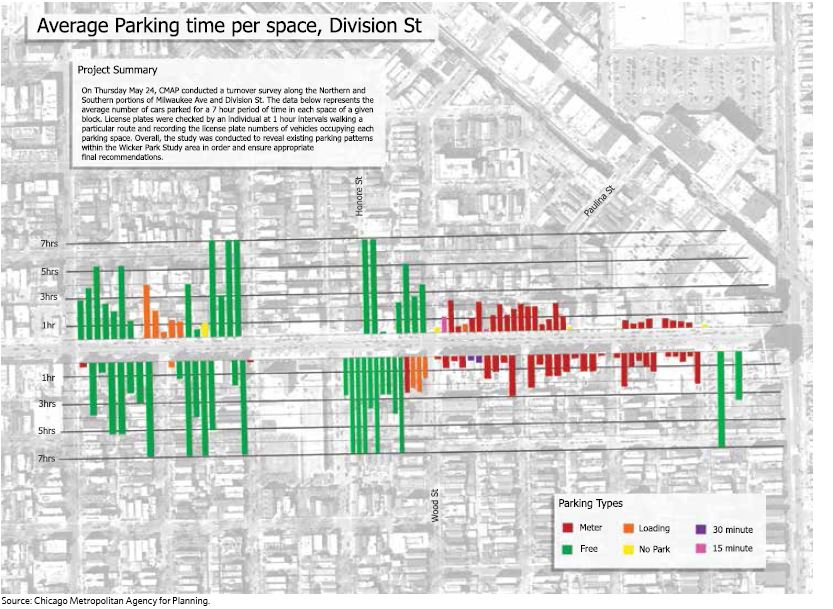Last year the Metropolitan Planning Council (MPC) partnered with the Chicago Metropolitan Agency for Planning and the Wicker Park-Bucktown Chamber/Special Service Area #33 on a parking study for the Wicker Park-Bucktown neighborhood on the city’s near northwest side. We found that of the almost 12,000 on-street parking spots in the Wicker Park-Bucktown neighborhood, the vast majority—almost 11,000—are free and not metered. Some sections of even the high-traffic retail corridor had free parking, including Damen, Armitage, Ashland and Western avenues and Division Street.
On streets with many destinations and high retail activity, the free parking is often used not by customers, but rather by residents and employees who park their cars for extended periods of time, sometimes all day. As seen in the image below, a turnover survey on Division Street between Ashland and Damen revealed that about half the street is metered and half is free. None of the cars in the metered spaces stayed longer than three hours, while most of the cars in the free spaces stayed for at least three hours, and 17 cars were parked for the entire seven-hour duration of the survey. The result? The free parking is damaging to local businesses whose customers struggle to find a parking spot near their destination. Because this is a busy retail corridor, it makes sense to have paid meter parking—keeping parking free in retail districts encourages driving (and thus undermines transit investments, leading to more driving) and charging for parking means the people who do choose to drive can find a parking spot, shop or dine, and then leave, opening up that spot for another driver to visit those businesses.

The study recommended that the city install parking meters on W. Division St. from N. Hoyne Avenue to N. Damen Avenue, which has been accomplished. Alderman Moreno introduced and Chicago City Council recently passed an ordinance to meter that stretch of Division Street.
Aldermen know free parking often hurts small business. The free parking on Sundays as a result of the 2013 Chicago parking meter concession renegotiation caused concern in some retail areas, as prime parking spots could be occupied by drivers who park their car on Saturday evening and leave it until Monday morning for free. A handful of aldermen initially requested that Mayor Emanuel reinstate paid parking on Sundays in these retail areas that depend on parking turnover and availability. In April 2014, City Council passed such an ordinance, reinstating paid Sunday parking primarily in the 32nd and 44th wards in select retail corridors in Wicker Park, Bucktown, Lakeview and Wrigleyville.
MPC proposes to go even a step further and implement performance pricing in the City of Chicago. We’ve recently issued an analysis on the 2013 Chicago parking meter renegotiation and outlined how to performance-price parking within the constraints of the concession.
Parking management can benefit everyone—even people who don’t drive. Good parking management balances the needs of drivers, businesses and their customers with overall transportation efficiency and community impact.
Solving the Parking Predicament Series
MPC’s Solving the Parking Predicament series offers an in-depth discussion of parking management. Beginning with a review of the parking problem and new strategies to solve it, each case study highlights best practices from around the country:
These case studies show how parking can develop out of a headache and into a demand strategy that facilitates and supports the use of alternative modes of transportation, builds business activity and boosts community ambience.